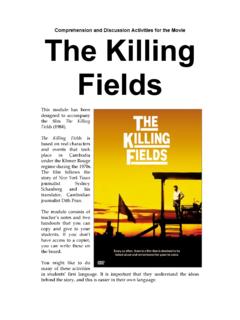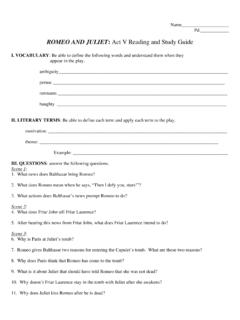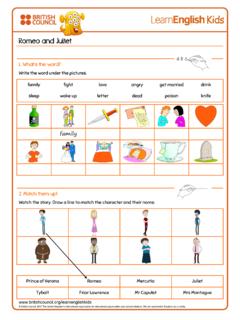Transcription of Romeo and Juliet tg 20 may - The Curriculum Project
1 Romeo and Juliet a Play and Film Study Guide Teacher s Book Romeo and Juliet a Play and Film Study Guide This study guide was written for students with pre-intermediate to intermediate level English. It takes students scene by scene through a simplified version of William Shakespeare s play Romeo and Juliet . Each scene is accompanied by comprehension and extension exercises. The playscript is printed at the back of the Student s Book. Students can just read the play to themselves, but we recommend that you give students parts and have them act out the play. Remember to change the parts around after every scene, or every few scenes, so that all students get a chance to participate.
2 We also look briefly at the 1996 film of Romeo and Juliet . This film uses original Shakespearean language, but sets the story in a modern city. We don t have a lot of comprehension exercises accompanying the film, as there isn t much point in getting intermediate students to understand Shakespearean language. However, if you are interested in reading the original, unsimplified play, the full text is available at along with many other resources for a higher level study of the play. Teacher s Book Page 1 Before You 1. The focus of the questions is to elicit the students background knowledge, ideas and predictions about Romeo and Juliet , the two central characters of the play.
3 Students can work individually and then the teacher elicits answers and writes them on the board. OR Students work in groups of 3 or 4, and discuss the questions. Each group explains their ideas to the rest of the class. Point out the following: Romeo and Juliet are the two main characters They are lovers (as students can see on the book and film cover) Their relationship will become strong and they will marry The film will have more action, and have a more modern setting than the play. 2. Students read the introduction to the play, and answer the questions. Answers: a. DS b. T c. F they want to get married d. DS Teacher s Book Page 2 Characters in the Play Go through this page with the students.
4 The pictures are of different productions of Romeo and Juliet . William Shakespeare wrote the play in 1597 and set it in Verona, Italy. It has also been made into films, plays, opera, dance and rock music productions, books, paintings and many other media. Different theatre companies have set Romeo and Juliet in different historical periods using people from various cultures and ethnic groups. The play students will read is still set in 16th century Verona, but uses simple, modern, pre intermediate level English. The 1996 film is set in a modern city, also called Verona, but uses Shakespearean English. Pre teach the titles Lord and Lady (rich, powerful people; less powerful than kings/queens and princes/princesses, but more powerful than ordinary people) and Father (a Catholic religious official).
5 Give out the roles to the students. For the first scenes, choose the strongest readers for the parts of Romeo , Juliet , Tybalt, Mercutio and Benvolio. Everyone without a named part takes the role of the servants, etc. Remember students can change parts after each scene or group of scenes. Students look at the playscript on page 10 of their books. Explain that the words in italics in brackets are instructions for the scene. They should not read these parts out, but perform the actions. Teacher s Book Page 3 Read Act One, Scene One 3. Students order the events Answers: b, d, e, c, a Read Act One, Scenes Two and Three 4. In pairs or small groups, students take about 5 10 minutes to prepare their summaries.
6 If you have time, have each pair (in a small class) or a few pairs (in a large class) read out their summary and write the main ideas on the board. 5. Students identify the women and what they are talking about. Answers: The women are (left to right) Juliet , Nurse and Lady Capulet. They are talking about a husband for Juliet . 6. Students answer the questions. Answers: a. The messenger can t read the list of names, so he asks Romeo to read it for him. b. Rosaline will be there. c. Because he is young, rich and good looking, and friends with Prince Escalus. d. She doesn t say exactly, but probably not, because she doesn t know him. 7. In groups or as a class, students predict what will happen at the ball.
7 Write their ideas on the board. Read Act One, Scene Four 8. Look back at students predictions and discuss. Which ones were correct? Teacher s Book Page 4 9. This exercise looks at the original language Shakespeare used when he wrote Romeo and Juliet . Some classes might find this too difficult, so skip it if it is not appropriate for your students. In groups of four or five, students read the passages, also looking back at the playscripts. Groups decide who each person was talking to when they said these words, and rewrite the passage in modern English. Possible answers: a. Tybalt is talking to Lord Capulet: Uncle, this is a Montague, our enemy. He has come here to make trouble.
8 B. Lord Capulet is talking to Tybalt: People in Verona say he is a good person. I don t want you to harm him in my house. c. Nurse is talking to Romeo : Her mother is the house owner. She s a good and clever person. d. Juliet is talking to Nurse: Go and ask his name. If he s married, I will die without getting married. 10. In pairs, students write summaries of Act one. Check that they cover these points: The Capulet and Montague families are enemies Prince Escalus has warned them not to fight again or else Romeo was in love with Rosaline Romeo and his friends secretly went to to the Capulet ball Romeo and Juliet met, and fell in love Paris wants to marry Juliet Lady Capulet wants Juliet to marry Paris Tybalt saw Romeo at the ball, and wants to fight him Read Act Two, Scenes One and Two 11.
9 Students pretend to be either Romeo or Juliet , and tell the story of the party to one of their friends. Give students five minutes to prepare what they are going to say. If necessary, elicit a few sentences from the students and write them on the board. Make sure they are using the first person for this task, I met a wonderful man at the party last night, and I want to marry him. Students tell their stories to each other in pairs. Get a few students to tell their stories to the class. 12. In groups or as a class, students predict how the second act will finish. Write their ideas on the board. Read Act Two, Scenes Three and Four 13. Look back at students predictions and discuss. Which ones were correct?
10 Teacher s Book Page 5 14. Students put the events in order. Answers: e, b, h, g, f, c, d, a 15. Students have a choice of two writing assignments that they can start in class and finish for homework. Discuss these assignments with the class. Pre teach marriage vows the words which people say to each other when they get married. Here are some examples: "_____, do you take _____ to be your wedded [husband/wife] to live together in marriage. Do you promise to love, comfort, honor and keep [him/her], for better or worse, for richer or poorer, in sickness and in health. And forsaking all others, be faithful only to [him/her] so long as you both shall live?" (traditional Christian vows) "I, _____, offer you myself in marriage and in accordance with the instructions of the Holy Koran and the Holy Prophet, peace and blessing be upon him.
















